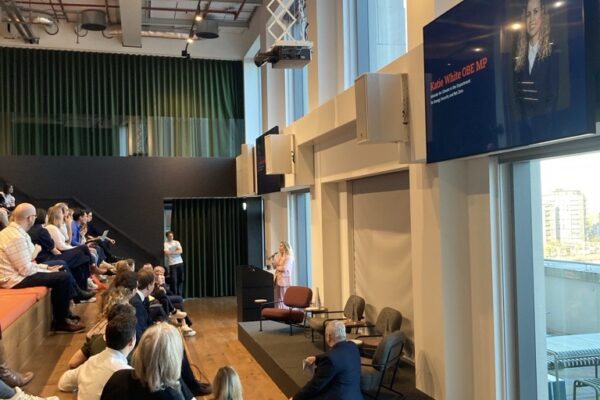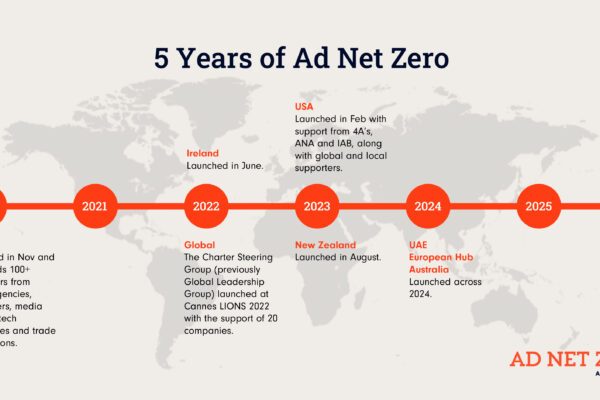For this year’s International Women’s Day, we took time to reflect on the influential role that women are playing in climate action, driving solutions in the US and around the world.
In our research, we found no shortage of examples! Below are a few we chose to spotlight.
Last, but certainly not least, we also want to honor and thank the incredible women in our Ad Net Zero community who are driving progress in sustainability for the ad industry!
____________________________________________________________________________

In numerous regions across Africa, women play a pivotal role in smallholder argriculture, overseeing about 70% of the sector. Despite their contributions, many of these areas still grapple with food shortages. We Are the Solution, led by rural women in West Africa, aims to revive ancestral food production knowledge, promote land stewardship, and provide nutritious food for those facing scarcity. The campaign conducts workshops, forums, and radio broadcasts to reach rural communities and supports collective land management by purchasing farms.
The Women in Climate Entrepreneurship initiative aims to empower female business leaders throughout India, helping to nurture their energy access innovations. The program focuses on skill-building and providing women entrepreneurs with the confidence and knowledge needed to effectively grow their business – particularly in a market where women face significant socio-cultural barriers, and where sustainable solutions are a great need.
In South Louisiana, USA, where oil and gas extraction has ravaged biodiversity and disrupted Indigenous livelihoods, women of the Houma Nation have partnered with WECAN International to restore biodiversity, bolster climate resilience, and promote community health and well-being in the region. Through initiatives such as cultivating native plants and trees, producing local medicines, and revitalizing traditional ecological practices, participants not only generate income but also establish sustainable food supply chains, ensuring long-term food security.
Rapid development poses a significant threat to Mayan territories, endangering food sovereignty and displacing many small farms from the region. In response, DESMI (Desarrollo Económico y Social de los Mexicanos Indígenas) aims to uplift rural communities and advocate for the rights of small-scale farmers, the majority of whom are women. Through the establishment of eight agroecology centers, DESMI has empowered 200 communities with valuable knowledge in areas such as preserving native seeds, implementing soil conservation practices, diversifying crops, and utilizing traditional fertilizers.
Intersectional Environmentalist (IE) is a pioneering organization founded in 2020 with the goal of dismantling oppressive systems within the environmental movement. Led by Leah Thomas, Diandra Marizet, Sabs Katz, and Phil Aiken, IE swiftly grew into a vital resource center and movement. By prioritizing justice and equity, IE reshapes environmental discourse, advocating for inclusion of communities of color in decision-making and education. Their services, including workshops and consulting, empower individuals and organizations to integrate intersectional principles into environmental work, fostering a more equitable future for all.
The Indonesia Women’s Earth Alliance Grassroots Accelerator aims to empower local women to defend their communities and ecosystems against environmental and climate-related risks, such as palm oil extraction, plastic pollution, and rising sea levels. Through a 4-month training program, female leaders are equipped with skills spanning various sectors, including forest and coastal ecosystem protection, land rights advocacy, Indigenous knowledge preservation, gender equity promotion, and community mobilization. This initiative aims to scale up climate resilience efforts in Indonesia.
The Women in Climate (WIC) initiative is a network of over 180 individuals dedicated to tackling the global climate crisis. Through face-to-face collaboration opportunities, WIC convenes leaders from diverse sectors such as business, tribal, scientific, political, nonprofit, and social justice sectors, to brainstorm innovative climate solutions, devise implementation strategies, and establish new partnerships to replicate these solutions across various regions. These multi-day Innovation Labs focus on intersectionality, climate policy, and natural climate solutions, ensuring real and impactful strategies emerge to combat climate change.
View this post on LinkedIn.




